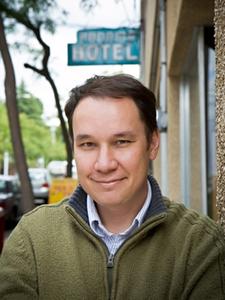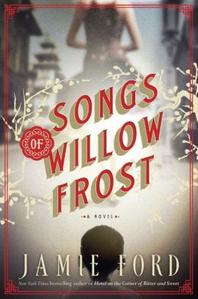
|
|
| photo: Laurence Kim | |
Jamie Ford's debut novel, Hotel on the Corner of Bitter and Sweet, spent two years on the New York Times bestseller list and went on to win the 2010 Asian/Pacific American Award for Literature. Now, in Songs of Willow Frost (see our review below), Ford explores Depression-era Seattle through the eyes of 12-year-old William Eng, a resident of Sacred Heart Orphanage who hasn't seen his mother in seven years. During a visit to the Moore Theatre, William sees an actress called Willow Frost and is convinced she's his mother, Liu Song. Desperate to find her, William and his blind friend, Charlotte, escape the orphanage, but the truth of Willow Frost and Liu Song is more complicated and tragic than William ever imagined.
Jamie Ford is the great-grandson of Nevada mining pioneer Min Chung, who emigrated from Kaiping, China, to San Francisco in 1865, where he adopted the western name "Ford," thus confusing countless generations. He recently spoke with us about Songs of Willow Frost, the strong women in his own life and the early American film industry.
Where did you get the idea for Songs of Willow Frost?
I totally ripped off James Patterson. No, I'm kidding! No, Willow started with a bunch of different things. I kept going back to the '20s and kicking around that time period in Seattle. There was a back-room gambling parlor called the Wah Mee Club. It's where my grandparents met, and it's where there was a horrific mass murder in 1983. Some gunmen held up the place and shot everybody, killed everybody. The building is vacant to this day. No one will touch it. It's bad luck. But it was the place that my grandparents met.
I always wanted to explore this era, and I was splashing around and found a mention of Sacred Heart orphanage. During the Depression, most of the orphans in the orphanage had parents, which was really surprising to me because when I think of orphanages, I think of the classic Little Orphan Annie story. I don't think of parents consigning their children because they couldn't afford to feed them, hoping to come back some other day.
Those two things collided and led to a story of an orphan and his mother. Then there were the proto-racial stereotypical characters like Anna May Wong and Japanese actor Sessue Hayakawa, who was very popular and then shunned when World War II erupted. It's always been interesting to me to see these ethnic actors, the things they had to compromise on in order to achieve success, and how their own cultural base reacted, which was usually unfavorably. I wanted a narrative to include those things.
What made you choose to pair the film industry with Willow and William's story?
I started looking at the film industry at the time, and I called the Washington Film Office and asked what the first movie was that was shot in the Northwest. The poor man that I managed to track down said the first movie was Tug Boat Amy, which was made in the '30s. I was looking at a film group up on Mount Rainier in the '20s and thinking, "There's got to be something we're missing here." There were film studios in the weirdest places because it took a while for early filmmakers to figure out that they could replicate scenery on a sound stage. There was a film studio in Coeur d'Alene [Idaho] and all these places you wouldn't imagine a film studio, and there was one in Tacoma, the H.C. Weaver Studio. It only produced three films, which have been lost. The soundstage burned to the ground in the '30s, but at the time it was the third largest film stage in America. They were making silent films just as talkies were starting, so they were dinosaurs by the time their movies came out.
How did you develop Willow's character and write so effectively from her viewpoint?
Anna May Wong, the actress, was a very sympathetic character. She's kind of the patron saint of unfulfilled love. She died unmarried and had various affairs with all these people in Hollywood. She couldn't have a Caucasian husband because a Caucasian man wouldn't have her in the way that she wanted, and in her own culture she was ostracized. Later in life, she went to China on this tour and hoped she'd be accepted, but she was a pariah. A lot of that emotional angst comes from that character.
Also, my grandmother was really a strong woman in a time when it wasn't acceptable to be that way. I think it made her really tough in her older, more mature years, but I think her younger years must have been pretty tragic. I just respected that about her. She's been gone for 15 years now, but she's still the woman of legend in my family.

The funny thing is, I like sci-fi/fantasy. I just read some of John Scalzi's books, and I can feel that stuff, I just can't write it. It doesn't hold my interest the way history does. In some families, particularly my family, a parent or grandparent wouldn't talk about something, no one would talk about it, so there were all these things in my parents' lives and my childhood that I wanted to ask about but I never did. As a writer and a researcher, I can go back and get the answers.
What's next for you?
I'm working on another book set in Seattle between 1909 and 1959. This one is about a boy who was actually raffled off at the 1909 World's Fair in Seattle. They had orphan trains running up until the 1920s. They'd take street kids from back East and just hand them over to people in the Midwest, and it seems really shocking to us, but back then it may not have seemed particularly cruel. It's definitely one of those moments where you think, "There's a story there."
What do you hope readers will take away from Songs of Willow Frost?
In general, I value books and movies. I throw movies in there because they're both the kind of medium that are about things. We have a long tradition of books and movies being about the human condition, but we're in the era of film and literature being about special effects. Literary jujitsu on the page, like a run-on sentence that lasts for 14 pages, to my mind is the equivalent of a Transformers movie. I hope people feel that Willow is about something, that there's something to take away, that it's a story rather than just an arrangement of words on the page. --Jaclyn Fulwood, youth services manager, Latah County Library District; blogger at Infinite Reads

